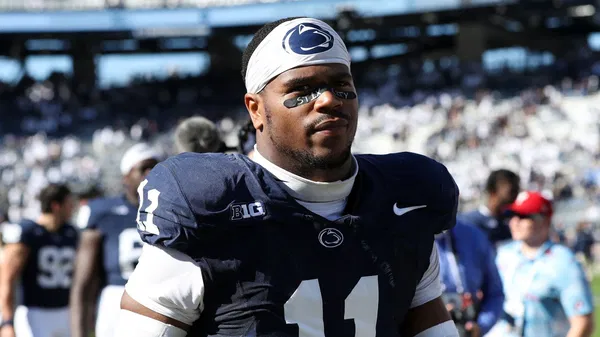
James Franklin’s tactical approach throughout the College Football Playoff (CFP) has revolved around meticulous game management. In both rounds leading up to the Orange Bowl, Penn State operated with controlled precision, rarely exceeding a comfortable level of exertion. Franklin seemingly opted to conserve his team’s energy, particularly with the expectation of facing a physical Notre Dame squad. However, this plan has encountered a major obstacle: Penn State’s standout linebacker Abdul Carter is unlikely to play at full strength, if at all.
Carter, known for his physical dominance and athleticism, sustained a shoulder or arm injury in the first quarter of the previous game against Boise State. While Penn State managed to overcome Boise State without significant difficulty, the challenge posed by Notre Dame is considerably greater. The Irish, under Marcus Freeman, rely heavily on a ground-and-pound offensive style that places significant demands on opposing defenses. Abdul Carter was expected to play a pivotal role in countering this strategy.
CFP Semifinals are here 🚨👀@joelklatt breaks down what to expect from Ohio State-Texas, and Notre Dame-Penn State in a new episode ⬇️
— The Joel Klatt Show: A CFB Pod (@JoelKlattShow) January 7, 2025
Prominent college football analyst Joel Klatt emphasized the critical nature of Carter’s potential absence in his analysis of the matchup. On his podcast, Klatt noted that Penn State’s defense relies heavily on Carter’s ability to neutralize dual-threat quarterbacks like Notre Dame’s Riley Leonard. Klatt explained that Carter’s versatility—both as a pass rusher and in pass coverage—is instrumental to Penn State’s success. Without him, Leonard’s ability to exploit gaps in the defense, especially during scrambles or designed quarterback runs, could become a significant problem for the Nittany Lions.
Klatt went further, stating that Carter’s athleticism is essential to counter Notre Dame’s offensive rhythm. Leonard thrives outside the pocket, making plays with his legs rather than relying solely on passing. Without Carter’s presence on the field, Penn State may struggle to contain Leonard’s mobility and effectiveness, potentially allowing the quarterback to take control of the game.
Compounding matters for Penn State is the uncertainty surrounding Carter’s health. Reports indicate that Carter has not participated in team training, and even if he does suit up for the game, his performance will likely be limited. Penn State insider Nate Bauer highlighted the emotional weight of this situation, likening it to a process of grief for the fanbase. Bauer expressed doubt that Carter would be able to perform at his usual dominant level, despite the team’s best efforts to accelerate his recovery.
While Penn State grapples with Carter’s situation, Notre Dame also faces its own challenges. Star running back Jeremiyah Love is dealing with a knee injury, and his status remains uncertain. Love, along with Riley Leonard, forms the backbone of Notre Dame’s rushing attack. Without Love, the Irish offense would become more predictable, allowing Penn State’s defense to focus on containing Leonard. Additionally, Notre Dame will be without their top defensive lineman, Riley Mills, who leads the team in sacks. These absences could balance the scales somewhat, but Penn State’s defensive struggles without Carter remain a major concern.
Despite the uncertainties, one thing is clear: if Abdul Carter is able to play, even at reduced capacity, his presence alone could have a psychological impact on Notre Dame’s offense. The sight of him on the field could force Riley Leonard to second-guess his decisions, providing a morale boost to Penn State’s defense. For James Franklin and the Penn State faithful, a miraculous recovery by Carter could be the difference between advancing to the national championship and falling short.
As the Orange Bowl approaches, much remains unknown. Both teams will need to adapt to the absence of key players, and the outcome will likely hinge on which side can better compensate for their losses.